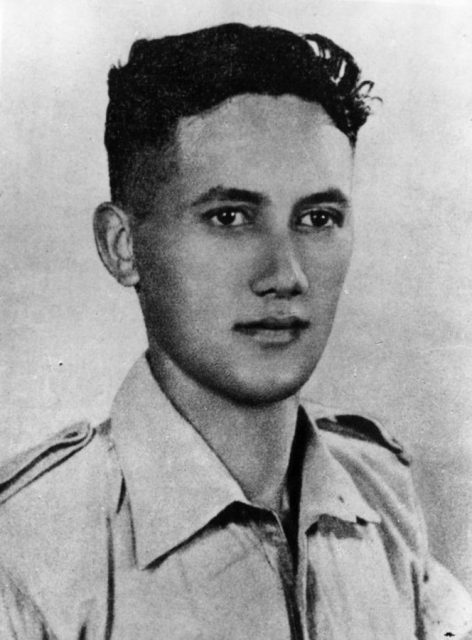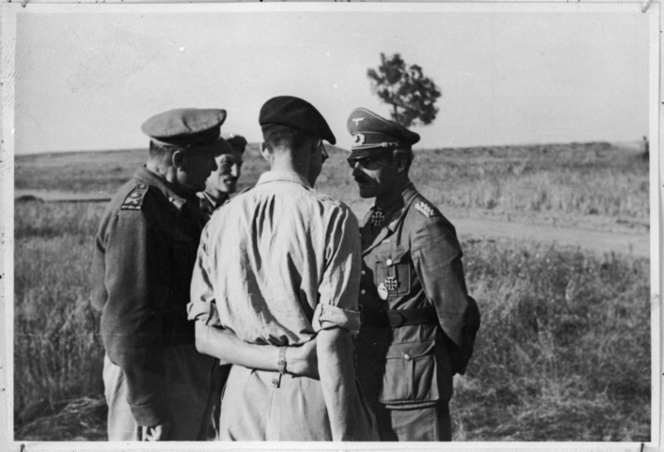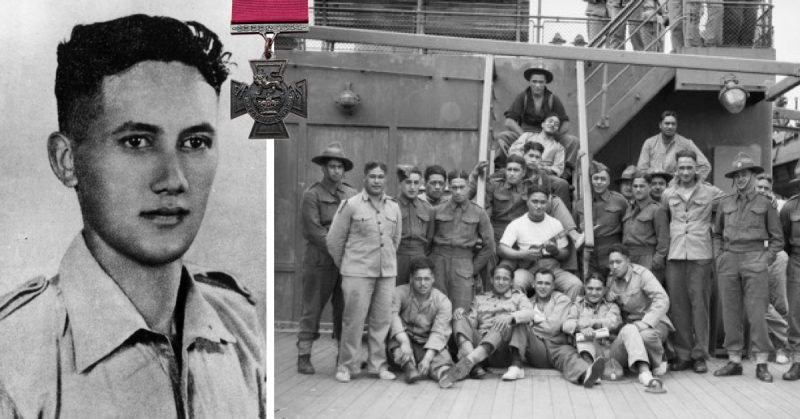It is a name that might be hard to remember in its entirety, but that is only until people learn of the inexplicable gallant last stand he made in Tunisia against the Germans. Then it is realized this is a name that must be remembered and honored in the halls of military history.
Moana-Nui-a-Kiwa Ngarimu was a New Zealand soldier who served with the 28th Maori Battalion. He served with distinction for several years until ordered to take a hill named Point 209 – then his name joined the recipients of the Victoria Cross.
To take the hill, Ngarimu led his men against a determined German defense. When they reached what they thought was the top, it became apparent that it was a false summit and just 20 yards away lay the rest of the German defense in an elevated position. Throughout the night, Ngarimu led his men to repel one counter-attack after another. Severely wounded, Ngarimu was but one of a handful of men still alive and still in possession of the hill. Reinforcements came just in time as the Germans launched one last counterattack. There Ngarimu fell, blasting his Tommy-gun at the enemy until the very end.
An Honor to Fight
Moana-Nui-a-Kiwa Ngarimu was born in Whareponga, New Zealand, in 1918. Growing up, Ngarimu attended various schools and after college settled to work on his father’s farm as a shepherd. However, when the call to fight was issued Ngarimu swiftly responded. As the flames of WWII began to descend upon Europe, Ngarimu volunteered for the New Zealand Army in February 1940.
Joining the 28th Maori Battalion, he set out for the Middle East with the 2nd New Zealand Expeditionary Force. However, fate intervened, and they were diverted to England to defend against a possible invasion by the Germans. After time spent in England, Ngarimu’s force made their way to their original intended destination in Egypt in March 1941. From there, Ngarimu and the rest of the 28th Maori fought with distinction from Greece to Crete and back to North Africa.
For his leadership and proven ability in combat, Ngarimu was commissioned an officer in April 1942 and eventually became a platoon commander. By March 1943 as the Allies began to push back across North Africa, the 28th Maori was engaged in combat operations in Tunisia. There Ngarimu made his final stand and earned his place in the halls of military history.

Taking the Hill
To dislodge the Germans, the terrain known as the Tebaga Gap had to be taken. Multiple hills surrounded the area containing Germans not too keen on giving them up. The Allies pushed through the region and during heavy fighting, Ngarimu’s 2nd Platoon of the 28th Maori was ordered to take the hill known as Point 209. It was defended by elements of the 433 Panzer Grenadier Regiment, and they did not intend to leave.
On March 26, Ngarimu led his platoon up the slope of what they believed was the summit of Point 209. Charging through heavy mortar and machine-gun fire, Ngarimu was the first to crest the hill. Alone, he destroyed two of the enemy machine-gun positions. In the face of a determined attack with Ngarimu at the front, the German defense withered and retreated. The 28th then realized it was not the summit as German machine-gun fire continued to sweep the hill.
German mortars began to rain down on the pre-sighted position as they launched a counter-attack. Ngarimu urged his men to stand and fight doing his worst upon the enemy. Mowing them down, what remained of 2nd Platoon devastated the attacking Germans. At that point, Ngarimu was wounded by both rifle fire and shrapnel. He was encouraged to head back for treatment but refused. He insisted on staying with his men.

Surviving the Night
As darkness fell, 2nd platoon dug in on the forward slope of the hill with the Germans some 20 yards away on the reverse slope. Close enough to hear each other shout, the Germans launched one counter-attack after another throughout the night. Ngarimu and his men held. Ngarimu could be seen monitoring his line and moving from position to position, as various points were breached. Firing when he could and in some cases throwing stones to beat back the enemy, they continued to hold.
By morning, only a wounded Ngarimu and two other ranks remained in his platoon. Fortunately, reinforcements arrived to relieve the beleaguered men. Unfortunately, the Germans had one more attack planned. They again screamed forward as they had all night, and Ngarimu could be seen on his feet fighting until the bitter end with his Tommy-gun. Already severely wounded, he sustained mortal wounds and finally fell.
As reports of Ngarimu’s brave stand became known, it became clear an amazing feat had taken place. For his actions that day, Moana-Nui-a-Kiwa Ngarimu earned the Victoria Cross. The honor was presented to his parents in October 1943 and was one of only two Victoria Crosses awarded to the famed Maori men.
Rightfully earned and with the eternal respect of all who witnessed him fight, Moana-Nui-a-Kiwa Ngarimu is a name to remember in military history.
